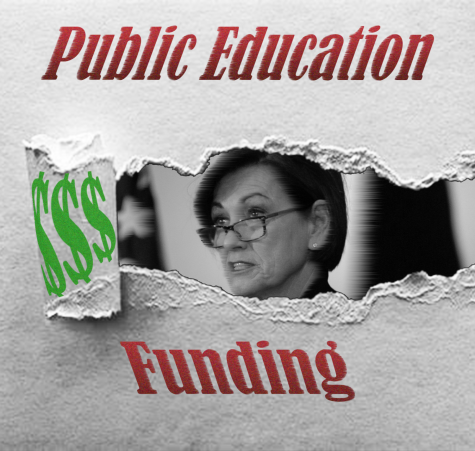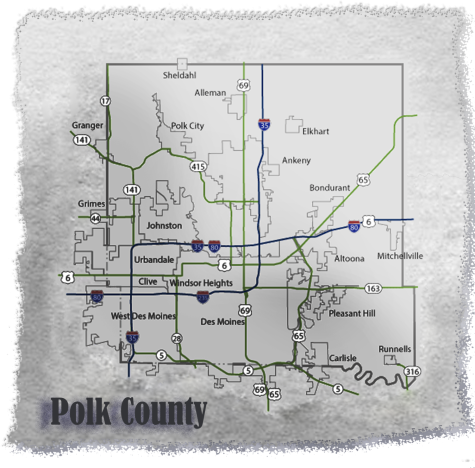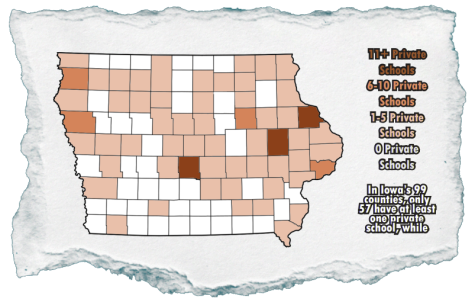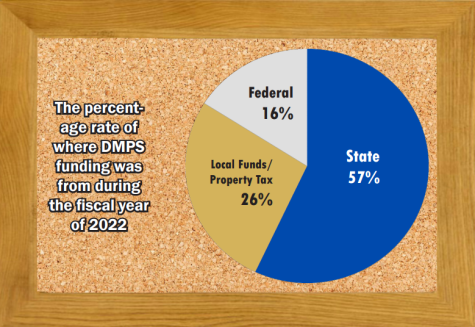What will be changing with education in Iowa
March 9, 2023

On Jan. 24, 2023, Iowa Governor Kim Reynolds signed a new law, House File 68, commonly known as the “School Choice” bill. This bill will have a significant impact on all schools in Iowa, particularly the Des Moines Public Schools district. The bill allows parents to help pay for private schools if one chooses to send a child to one with an education savings account. However, opponents of the bill argue that this will divert taxpayer money from public schools to private ones, with no government oversight over where the funds will go directly.
Under the new law, the state government of Iowa will use taxpayer money to fund private school student education through educational savings accounts, which will provide $7,598 a year per private school student to spend on tuition and other education expenses. This is the same amount of state aid given to public schools per student. Opponents of the bill argue that this is money that could have been spent on public school funding, which is already struggling due to rising inflation.
While the Iowa State Legislature approved a 3 percent ($107 million) increase in public school funding, some argue that it is not enough to keep up with inflation, and that the $107 million fund for public education is just giving back money that would’ve been a bigger amount back to public schools in smaller amounts. However, House Speaker Pat Grassley views the 3 percent increase as sufficient and called it a “very solid number,” Grassley said in a statement.
Many believe that this new law will negatively impact public schools, including teachers and students at East High School. They fear that the diverted funds will lead to fewer resources and opportunities for public schools. Overall, the bill remains a controversial topic, with both sides presenting valid arguments.

Polk County has 18 private school districts with 6,908 private enrollments, the highest in both throughout the state.
One side argument being that this claw gives parents who would like to send their kids to private school but can’t and if they already pay state educational tax then they should be able to use government funds obtain an education of their own choice, but one fatal flaw with this bill is that while it now gives parents who would like to send their child to private education a chance to do so, it doesn’t take into account that private schools could always just raise their admission fees, with the law seemingly only really helping parents who already go to private schools. One student with an opinion about the new changes is Mikaela Treptow, a sophomore, Treptow voiced her opinions about the law when asked about the following questions.
Q1: Do you think that the vouchers will harm public schools?
A: “I think that it will not be beneficial to public schools because it will be taking away the money that would have been going into public schooling, limiting the access that public schools have.”Q2: Even with the 3% increase to public school funds, do you think this will offset the balance between public and private school education?
A: “I think that it would definitely offset the balance, because it would just be even more money going into these private schools. Limiting even more of the money that public schools are already lacking. Causing public schools to fall even lower, lacking the funds to gain equipment to help learning, staff, etc.”Q3: Do you think our fund from the state, which makes up 57% of our funds, will be effected by this law?
A: “Oh for sure, I do think that the funding we get from the state would decrease with this. Because most or almost all of it comes from the state and tax payers, if part of this money that we are already lacking, already need more of to increase our learning would end up going to private schools. That already have this money and can pay for the good equipment and good teaching etc. It would definitely cause public schooling to become worse.”Q4: Do you understand why they would pass a law like this?
A: “I do see why this might have been a good idea, allowing parents to have more of a choice as in where their kid could be getting schooling. But if they want that good teaching and good environment from a private school, the money and time spent in making sure their kids get in and all that would be incredibly helpful to making our public schools have the same teaching and environment that they want from the private schools. If the money going into these private schools, being taken from public schools already lacking in money would have stayed in the public schools, environment that they want from the private schools. If the money going into these private schools, being taken from public schools already lacking in money would have stayed in the public schools, could be a factor in helping our schools grow and become better.”
When it comes to the balance between public and private schools, it seems that only a short few people will benefit from this voucher program, while many others think in the long run that this will only hurt public education in the states.
As the school choice bill takes effect, its impact on Iowa’s education system remains to be seen. While some believe it provides parent with more options for their children’s educational possibilities, other people in the states, and especially public educators and students, fear that the school choice bill will only harm public education in the state even more so. As the discussion of this law will certainly continue, the future of Iowa’s education system remains uncertain.



Sherry • Mar 9, 2023 at 12:24 pm
Who takes care of special ed kids!? Public schools do, so the need is there for xtra money!
Renee’ • Mar 9, 2023 at 11:41 am
This is a BS law just passed to appease Kimmy’s black money backers that have edged their way into the State. She is just their puppet! She is not taking into account what 3/4 of the State wants. Once again, the Republicans are driving Iowa public schools further down to the bottom. The lawmakers wonder why there is a teacher shortage in Iowa; the lack of budget to pay entry-level a living wage, the ridiculous gay and transgender laws passed by the Iowa legislature along with the governor’s insistence that the teacher’s curriculum be posted on-line prior to the upcoming year would drive anyone away from the Hawkeye State! In fact, season teachers aren’t going to put up with this s**t any longer. They’ve had it! They are done! Great job Republicans! Way to ruin our kid’s education???!